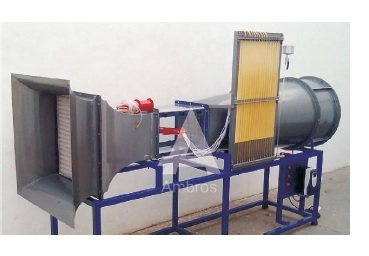
Open Wind Tunnel Apparatus
Technical Description
A wind tunnel is the classic experiment system for aerodynamic flow experiments. The model being studied remains at rest while the flow medium is set in motion, and thus the desired flow around the model is generated.
Open wind tunnel used to demonstrate and measure the aerodynamic properties of various models. For this purpose, air is drawn in from the environment and accelerated. The air flows around a model, such as an aerofoil, in a measuring section. The air is then decelerated in a diffuser and pumped back into the open by a fan.
The carefully designed nozzle contour and a flow straightener ensure a uniform velocity distribution with little turbulence in the closed measuring section. The flow cross section of the measuring section is square. The built-in axial fan with guide vane and a variable-speed drive is characterised by an energy-efficient operation at high efficiency. Air velocities of up to 28m/s can be reached in this open wind tunnel. The trainer is equipped with an electronic two-component force sensor.Lift and drag are detected and displayed digitally. The air velocity in the measuring section is displayed on the inclined tube manometer. The tube manometers is recommended for measuring the pressure curves in drag bodies.
Extensive accessories allow a variety of experiments, for example lift measurements, pressure distributions, boundary layer analysis or visualisation of streamlines. The well-structured instructional material sets out the fundamentals and provides a step-by-step guide through the experiments.
Learning Objectives & Experiments
– Determine drag and lift coefficients for different models
– Pressure distribution when flowing around drag bodies
– Boundary layer analysis
– Investigation of flutter
– Wake measurement
Features
* Open wind tunnel for a variety of aerodynamic experiments
* Homogeneous flow through the flow straightener and special nozzle contour
* Transparent measuring section








